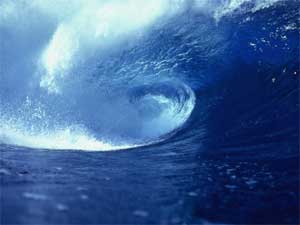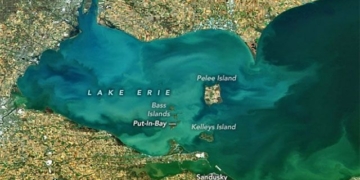”When you are at the beach, if you feel an earthquake and notice the sea suddenly receding, think that a tsunami may be approaching, and urgently run to higher ground immediately…”. This is one of the 15 essential pieces of knowledge about tsunamis recently released for free by the National Center for Meteorology and Hydrology, aimed at educating coastal residents to proactively respond to tsunamis.
 The release of this material is part of a tsunami warning plan assigned by the Prime Minister to the Ministry of Natural Resources and Environment.
The release of this material is part of a tsunami warning plan assigned by the Prime Minister to the Ministry of Natural Resources and Environment.
The tsunami materials are concisely presented with easily understandable images depicting tsunamis. This information is distributed to coastal communities and included in public awareness campaigns at schools and local media, especially in coastal areas.
The promotional content revolves around 15 Q&A regarding tsunami knowledge; the relationship between earthquakes and tsunamis; the differences between tsunamis and regular waves; the characteristics of offshore tsunamis and tsunamis near the shore; the damages caused by tsunamis; signs that may indicate a tsunami; the risks of an imminent tsunami; and what to do and what not to do when receiving tsunami warning alerts…
According to Mai Ai Truc, Minister of the Ministry of Natural Resources and Environment, spreading knowledge about tsunamis is extremely necessary, especially in the context that Vietnam does not yet have a tsunami warning system.
The experience of the tsunami in South Asia at the end of 2004 shows that due to general knowledge about tsunamis, many people managed to escape the deadly waves.
What are the signs of a tsunami? When a tsunami is about to occur, the sea surface often shows unusual fluctuations. If you notice signs of an earthquake and then see the sea level receding rapidly, it could be a sign of an impending tsunami.
– An earthquake is a natural warning sign of a tsunami. Remember that an earthquake can trigger a tsunami thousands of kilometers away just hours after the tremors occur.
What to do and what not to do during a tsunami? When you receive a tsunami warning, immediately evacuate to higher ground; do not attempt to use your phone or stand watching the approaching waves as tsunamis move very quickly.
– If you feel or hear about a strong earthquake, do not wait for an official tsunami warning; gather your family and friends and run to higher ground…
Kieu Minh


















































